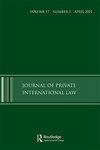Ordre public and non-enforcement of judgments in intra-EU civil matters: remarks on some recent Polish-German cases
IF 0.5
Q3 LAW
引用次数: 0
Abstract
The article discusses the enforcement of foreign judgments within the European Union and the public policy (ordre public) exception. It is mainly focused on some recent judgments of Polish and German courts. On 22nd December 2016 and 23rd of March 2021 rulings in cases of infringement of personality rights were issued by the Court of Appeal in Cracow (ordering an apology and correction). The enforcement of the former ruling was dismissed by the German Supreme Court (Bundesgerichtshof, BGH) (IX ZB 10/18) on 19th July 2018. The non-enforcement was justified by invoking German ordre public and “freedom of opinion” as a constitutional right stipulated in Article 5 of the German Constitution (Grundgesetz). A reference to the CJEU ruling of 17 June 2021 is also presented. After presenting the issue of ordre public in the context of enforcement of foreign judgments within the EU, the authors evaluate as questionable the argumentation of the BGH in its 2018 judgment. The Polish ruling ordering the defendant to correct and apologise for the false statement was included by the BGH in the category of “opinion” (Meinung) protected by the German Constitution. Enforcement of the judgment of the Polish court in Germany was held to be contrary to this German constitutional right and the enforceability of the Polish judgment was denied as being manifestly contrary to German public policy. The authors support the functioning of the ordre public clause in intra-EU relations. It is justified inter alia by the large differences in EU legal systems and future possible changes. However, the common standards of the ECHR should be particularly taken into consideration when applying the public policy clause, because they co-shape the EU legal systems.欧盟内部民事案件判决的公开性和不执行性——对波兰-德国近期一些案件的评论
本文讨论了外国判决在欧盟范围内的执行以及公共政策(公共秩序)例外。它主要集中在波兰和德国法院最近的一些判决。2016年12月22日和2021年3月23日,克拉科夫上诉法院发布了侵犯人格权案件的裁决(要求道歉和纠正)。2018年7月19日,德国最高法院(Bundesgerichtshof, BGH) (IX ZB 10/18)驳回了先前裁决的执行。不强制执行的理由是援引德国公共秩序和“意见自由”作为《德国宪法》第5条规定的宪法权利。还提出了欧洲法院2021年6月17日裁决的参考资料。在提出了在欧盟执行外国判决的背景下的公共秩序问题之后,作者认为BGH在其2018年判决中的论点值得怀疑。波兰要求被告纠正并为虚假陈述道歉的裁决被BGH列入受德国宪法保护的“意见”(Meinung)类别。在德国执行波兰法院的判决被认为违反了这项德国宪法权利,波兰判决的可执行性被否认为明显违反了德国的公共政策。作者支持秩序公共条款在欧盟内部关系中的作用。除其他外,欧盟法律体系的巨大差异和未来可能发生的变化是合理的。然而,在应用公共政策条款时,应特别考虑ECHR的共同标准,因为它们共同塑造了欧盟的法律体系。
本文章由计算机程序翻译,如有差异,请以英文原文为准。
求助全文
约1分钟内获得全文
求助全文

 求助内容:
求助内容: 应助结果提醒方式:
应助结果提醒方式:


